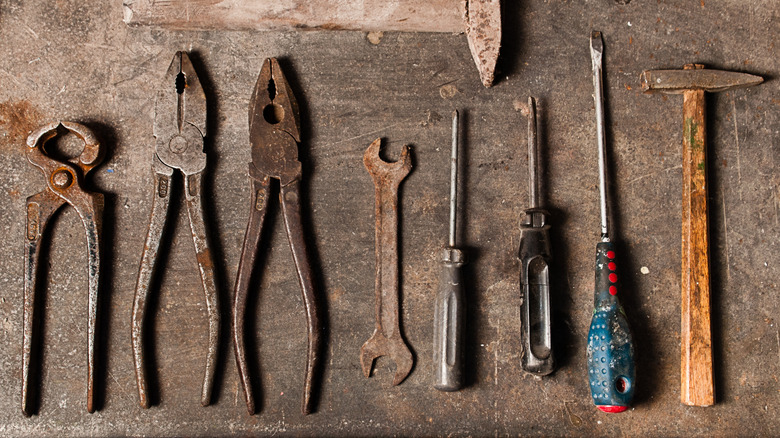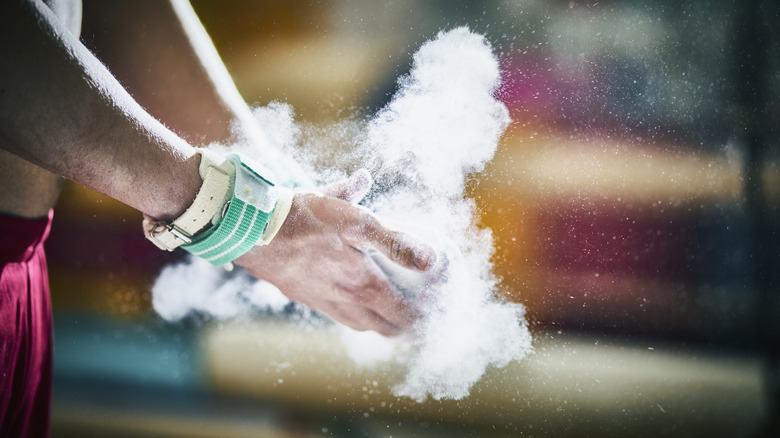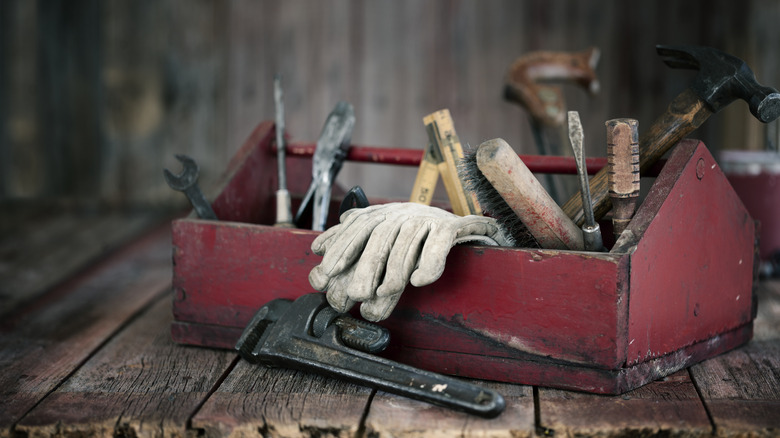The Budget-Friendly Hack To Keep Your Tools From Getting Rusty
Rust is a natural byproduct of environmental factors interacting with iron. Iron will lose electrons to the air in a process called oxidation, and the resulting molecules will latch onto water at those open sites to form iron oxide — better known as rust. Of course, knowing about the science behind this phenomenon doesn't make it any less annoying to find your tool are beginning to rust. Steel, one of the most-used construction materials, is an alloy composed partially of iron, and thus any steel structure could be susceptible. Iron tools you use for your DIY projects can succumb to rust just as easily, if not more so, given that thin iron rusts through faster than thick sheets. Instead of letting your tools corrode, try a cheap preventative measure: storing them with chalk.
Chalk is a limestone material made from fossilized microbes, one that you're probably most familiar with from those good old days spent doodling on your front driveway. There are a lot of surprising ways you can use chalk around the house, from DIYing your own paint to marking the areas you want to set new wall decor. Even a few sticks of chalk can help combat rust by absorbing one key ingredient needed to form iron oxide: moisture.
Chalk will absorb moisture in your toolbox
Chalk's ability to absorb moisture is used in many other activities. Rock climbers and gym enthusiasts will carry chalk bags to coat their hands as a way of absorbing sweat, making it easier to grip a rocky surface or heavy weight. This same property is what makes chalk a great and budget-friendly way to keep your tools from getting rusty. A bucket of sidewalk chalk costs around $12, and climbing chalk, like this Friction Labs Magic Chalk Ball on Amazon, can often be found for under $10. Solid pieces will be easier to store and maintain, but it's your choice as to what you would prefer.
The important thing is that you should be adding pieces of chalk to your toolbox. This is more of a preventative measure, as chalk won't remove existing rust on tools; it's simply a way to try and stop it from forming in the first place. That being said, the chalk you use to absorb moisture could come in handy in other ways, too. Fine chalk called whiting is used in cleaning powders and polishes, and it can also be mixed with cleaners and water to create a paste for removing oil stains. Depending on the kind of projects you take on, this cleaning substance could be invaluable.
Chalk is just one element of rust prevention for your iron tools
Using chalk like a packet of silica gel is just one way you can protect your tools from getting rusty. Your iron tools should be cleaned after every use, and regularly coating them with oil will prevent the metal from directly contacting the air and moisture, slowing the onset of oxidation. Applying a layer of paint or galvanized zinc can also slow the rusting process, though painting any tools in active use might not be the most practical solution. That said, it's worth painting any exposed metallic parts of the handle. Heat accelerates the speed of chemical reactions, so storing your tools in a cool, dry place will also prevent rust from forming.
Chalk helps keep tool storage dry, and any leftover pieces can also be used in other parts of the home. For example, it's beneficial to store chalk underneath your bathroom sink, where an abundance of moisture in the air is a leading cause of mold growth. Chalk is more versatile than its common uses in climbing or classrooms suggest, making it a valuable buy for DIY enthusiasts with many tools.


